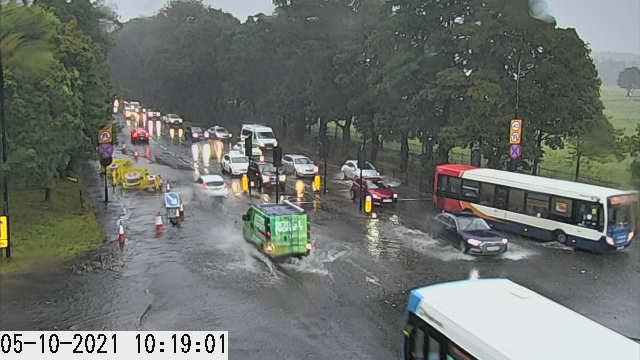
Flooding in Newcastle October 2021
Newcastle City Council is consulting on a new Movement Strategy policy and is asking for comments by 29 November 2024.
You can complete the online questionnaire here, and there is also an information brochure.
It asks residents and organisations to judge different objectives from ‘not important’ to ‘very important’. Objectives include improving different types of transport, EV charging, safe, accessibility, air quality and congestion. There are also free text fields where you can add your own thoughts.
According to the Council, the final strategy will be presented to Cabinet in “Spring 2025” after which it will develop an implementation plan. No timescales are given for the implementation plan, or for any schemes that may be proposed as a result of the plan.
This blog sets out some thoughts on how to respond, but first please forgive us for having a bit of a rant. Normally, we try to address issues calmly, but with this consultation we are feeling somewhat differently. This is why:
What does SPACE for Gosforth think?
You would be forgiven for having a sense of deja vu.
Newcastle City Council has already consulted on transport policy via its Development and Allocations Plan and its 2040 Local Plan early engagement consultation, transport-related air quality via the Clean Air Zone consultation, walking and cycling via its LCWIP consultation, and Streets for People consultations in Jesmond, Fenham and Heaton. It has an air quality plan action plan, a Net Zero transport plan, and a strategy for safer, cleaner, greener neighbourhoods set out in the Reframing Transport report approved by Council Cabinet.
Transport North East, which was made up of seven north east authorities including Newcastle consulted on its North East Transport Plan, the North East Active Travel Strategy, its Making the Right Travel Choice strategy, and has also asked for feedback via a Walking and Cycling Survey. The new Mayoral Authority has just launched a separate consultation on an update of the NE Transport Plan, which the tweet below refers to.
https://twitter.com/NorthEast_CA/status/1853430338824912909
Meanwhile, legal air quality limits that should have been met by 2005 have still not been achieved, minimal progress has been made to decarbonise transport since Newcastle City Council’s 2019 declaration of a Climate Emergency (target net zero by 2030), nor has there been any progress to cut road deaths and serious injuries (target “no fatalities or serious injuries on the regions’ road network by 2025″). Experimental schemes to cut traffic in local areas have been removed, the school streets programme under-delivered and has now been stopped, and the Council abandoned its commitment to the LTN1/20 cycling safety standard at one of the locations it is needed most (Gosforth High Street).
Now, the Council asks us whether Newcastle’s transport networks should prioritise cutting air pollution, carbon emissions or road collisions up to 2045, when by 2045 they should (according to the Council’s current targets) have already been net zero, compliant with legal limits on air pollution, and without death or serious injury for at least 15 years.
What confidence should we have that any new plan will deliver on any of these new objectives when it fails to acknowledge existing policy or objectives, and when the (now former) Cabinet lead for transport dismissed residents supporting safer streets as ‘the cycle lobby‘?
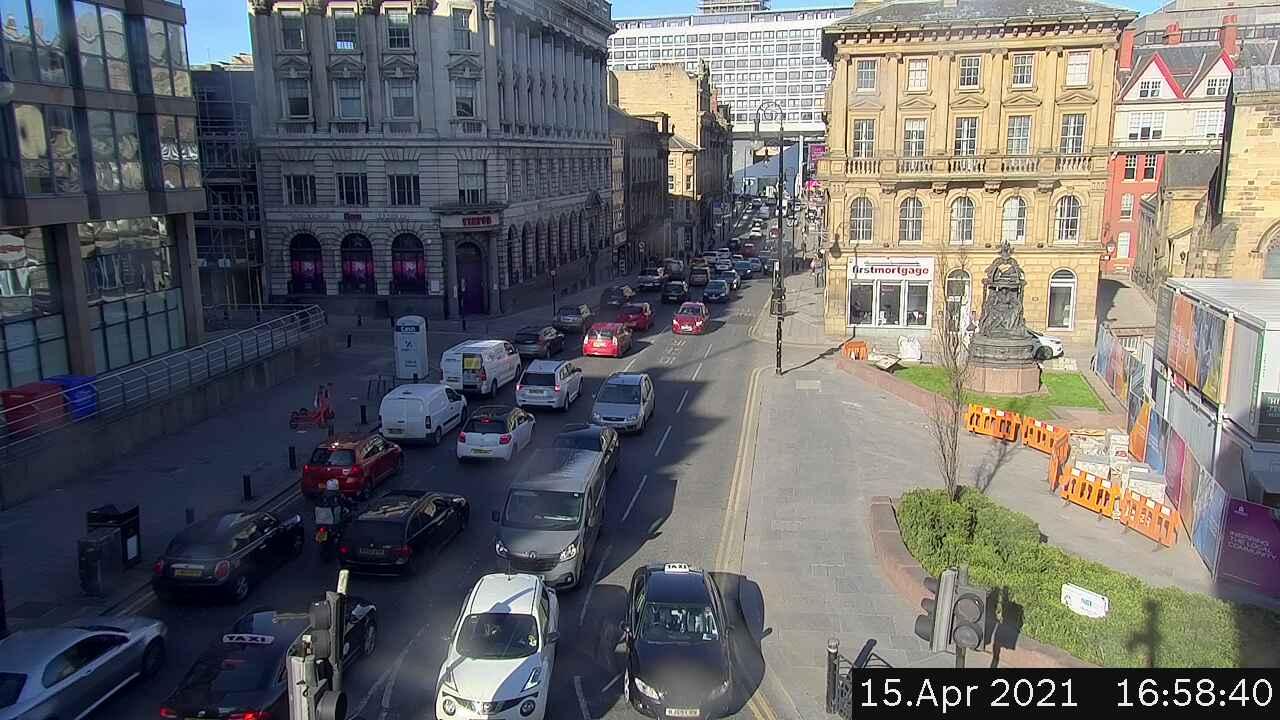
City Centre Traffic – priority to vehicles
Rant Over
That all said, this consultation is part of the process to create the new Movement Strategy, and if you don’t respond your view won’t be taken into account – so please do complete the Council’s survey.
Most of the consultation asks you to select an option from “very important” / “strongly support” to “not important” / “strongly oppose”, and there’s little to disagree with. It’s a bit like asking do you want cake, biscuits and ice cream? And, unlike in the real world, you can have all of them without having to choose.
There are four free text questions where you can fill in your own thoughts. Our suggestions for additional priorities, principles and actions are below.
1. Are there any other priorities you think should be included?
Our suggestions for additional priorities are “good quality places”, “enabling children to travel independently”, and ‘achieving the net zero target’.
The strategy should be a strategy for streets rather than just movement. Roads aren’t only used for movement. Gosforth High Street, for example, is a destination and should be designed as such and not as a traffic-thoroughfare. This aligns with the proposed action ‘enhancing Newcastle’s public spaces’.
Enabling children to travel independently and safely on foot or by cycling to school, especially High School children who are expected to travel independently over quite long distances, should also be a priority. The recent adjudication on Gosforth Academy admissions stated that “The youngest pupils at GA (Gosforth Academy) are in Year 9; they are 13 years old and therefore most, if not all should be able to travel to school unaccompanied”, also noting that the shortest walking route between Gosforth Academy and Great Park Academy is 2.6 miles.
Achieving the net zero target is not in the Council’s list of priorities but should be. Achieving the Council’s 2030 net zero target will be a significant factor in deciding which schemes to prioritise.
We also suggest ‘Reducing traffic congestion’ is replaced by ‘Reducing traffic’ to align with the proposed action to ‘reduce private vehicle use’. This will reduce congestion, as well as reducing air pollution and carbon emissions.
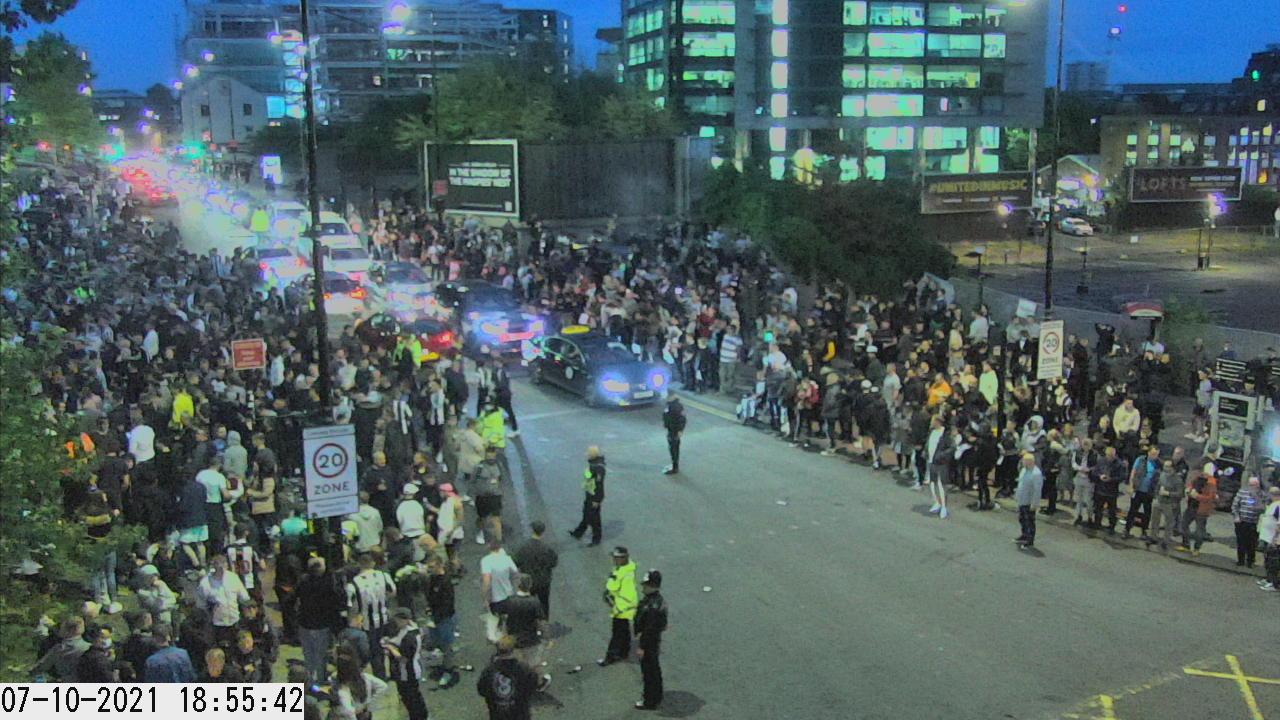
Football fans leaving St James Park after a match
2. If you have any suggestions for additional principles that should be included in the Movement Strategy, please include them here.
Our suggestion is “Vision Zero”.
One of the proposed principles is ‘healthier, active and safe’ but we think safety should be a separate principle to apply to all modes of transport, not just active travel.
Vision Zero is based on the principle that “it can never be ethically acceptable that people are killed or seriously injured when moving within the road transport system”, or in other words “Life and health can never be exchanged for other benefits within the society”.
This should focus on addressing the sources of danger, e.g. using the hierarchy of hazard controls, and emphasises that responsibility for safety is shared by transport planners and road users, rather than being solely the responsibility of road users.
It should also involve a commitment to the consistent use of best practice standards such as LTN1/20.
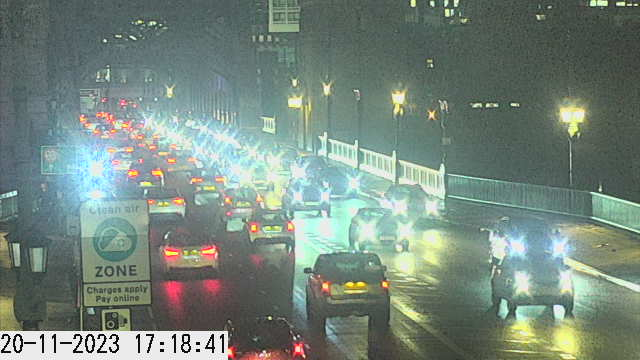
Traffic on the Tyne Bridge – how should the Tyne Bridge be used in future?
3. If there are any additional actions you think we should take to improve transport in Newcastle please tell us about them here:
Our suggestions are:
- In Net Zero Action 2 – making Our Transport System Climate Resilient, include “Ensuring the winter maintenance plan allows people to continue to walk and cycle safely during bad weather.”
- In Net Zero Action 2 – Promoting low-emission vehicles, ensuring freight and delivery services use ultra-low emission vehicles should also include enabling the use of cargo bikes for freight as an alternative to small vans.
- In Net Zero Action 3 – Encouraging Alternatives to Driving, add plan for micro-mobility e.g. eScooters, to anticipate future trends.
- In Sustainable Growth Action 1 – Improving Access to Opportunities. “Creating a high-quality walking and cycling network connecting neighbourhoods and shopping areas” should be “Creating and maintaining a high-quality walking and cycling network connecting neighbourhoods and shopping areas”.
- In Inclusive, connected and efficient Action 1 – Designing For All, add “Well maintained pavements and cycle lanes clear of obstructions such as EV charge points and pavement parking”
- In Inclusive, connected and efficient Action 2 – Improving local connections add
- Reducing severance e.g. by improving pedestrian and cycle crossings over the Urban Motorway and the A1 Western bypass.
- In Inclusive, connected and efficient Action 2 – Improving local connections “Implementing traffic reduction schemes in neighbourhoods” should include the use of low traffic neighbourhoods to prevent non-local traffic using neighbourhood streets as a short cut to avoid queues on the main road network.
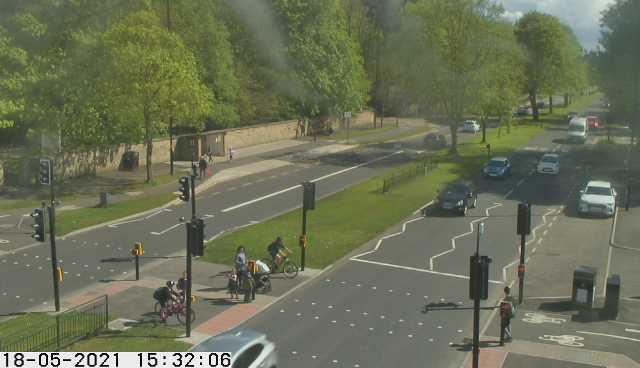
Crossing the Great North Road, north Gosforth
4. If you have any final comments or suggestions about the proposed Movement Strategy, please tell us about them here:
- The strategy needs to prioritise urgent action now rather than blue-sky policy making with no real-world impact. The city is long-overdue to meet legal air quality targets and only has five years left before the 2030 Net Zero target.
- A strategy needs leadership willing to implement the strategy, not give up at the first sign of disagreement. There’s no political choice that has unanimous backing, and that is as true for transport as every other domain.
- The strategy should include a plan for engaging with residents. This should include rapidly challenging false narratives and incorrect information e.g. false claims such as LTNs causing additional traffic on main roads or reducing emergency vehicle response times.
- If the plan is to replace existing policy, e.g. in the DAP or Reframing transport, it should ensure it is more ambitious and include any actions from the DAP and other policy documents that are still relevant.
- Road safety should be non-negotiable, and not tradeable for other benefits (Vision Zero).
- Actions that support all principles should be given the highest priority, for example a safe accessible, all age and ability cycle network would improve safety, improve health, cut emissions and pollution. Likewise, actions that have a negative impact on multiple objectives e.g. increasing road capacity for vehicles, should not be pursued.
- The strategy needs to include firm metrics for how progress will be measured with time-bound targets.
Please complete the Council’s online questionnaire online questionnaire by 29 November 2024.
If you think we have missed any important points please let us know via the comments below.
What do you think our transport networks should look like in 20 years? We need your views and ideas to help us develop a Movement Strategy that will shape transport development across the city. You can find out more and take part in our consultation now at https://t.co/daGzf9j92r pic.twitter.com/OZOfMejZa6
— Newcastle City Council (@NewcastleCC) October 14, 2024
